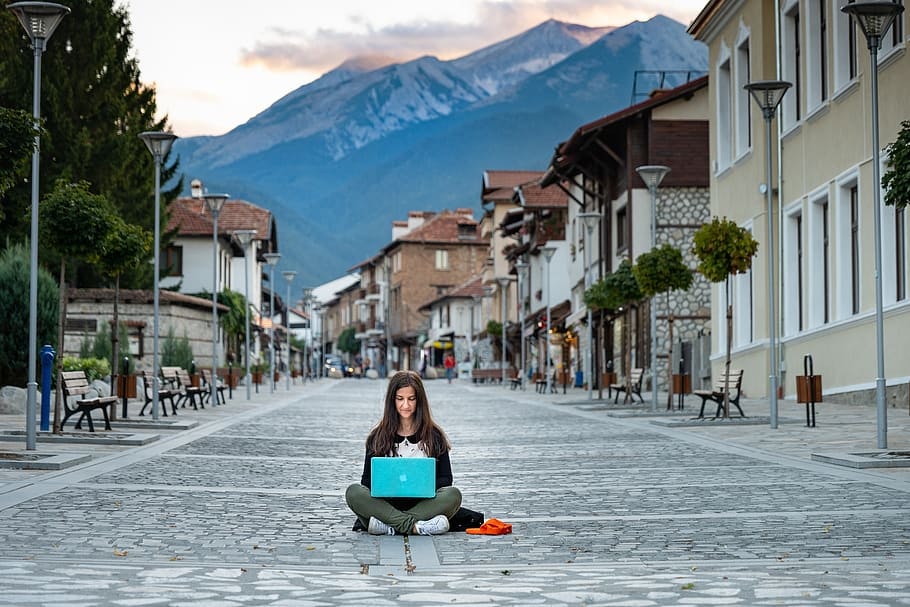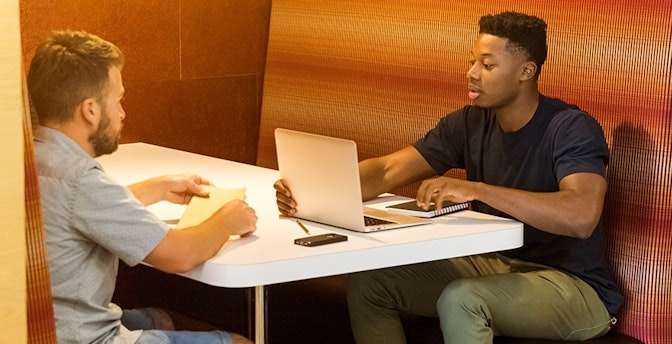Planes are grounded. Borders are closed. Businesses are shuttered.
The COVID-19 pandemic has wreaked havoc on the whole world as life grinds to a halt and billions of people are ordered to stay home.
It’s a devastating time for many… and a peculiar time for a digital nomad.
Their life, and often their identity, is built around constantly being on the move. We’re hearing governments around the world urge against “nonessential travel,” but what happens when you’re practically an embodiment of nonessential travel?
The nomad experience varies drastically. For some, the biggest misfortune is being bummed over their canceled summer adventures. For others, it’s a dire emergency as they find themselves stranded abroad.
Let’s explore some of the experiences and decisions digital nomads are facing as they navigate how to put their lives on hold and quickly choose a backup plan.
Post Contents



Canceled Plans and Travel Bans
There’s nary a nomad who hasn’t been impacted in some way. Even if you have every intention of following through on your spring and summer travels, you’ve probably experienced canceled flights or travel bans that make it tough or impossible to get to your destination.
I feel your pain. I was planning a full summer of gallivanting through Europe, with pit stops in several countries to visit old friends, soak in the sights, and inhale the food I’ve been missing.
→ Click Here to Launch Your Online Business with Shopify
Back to the drawing board.
But all things considered, I’m one of the lucky ones who didn’t have too much booked apart from my first flight across the pond. Time will tell how that works out.
Unfortunately, there are countless painful tales of nomads who are out hundreds or thousands of dollars after their fully-booked trips were all canceled. Airfare, hotels, tours – the works. Many are still struggling to recoup those lost funds.
Just visit the social media profiles of any travel service company and it’s immediately apparent that there’s a pattern here.
Like this Twitter complaint to Ryanair:

Or this Facebook post about Airbnb:

Should I Stay or Should I Go?
Perhaps the biggest decision any nomad is facing (or likely already has faced) is the decision to bolt back to their home country or hunker down where they are.
Chris Mitchell of Traveling Mitch took the “go home” route. He was abroad with his partner in mid-March when they realized the gravity of the pandemic. They immediately cut their trip short, heading back home to Toronto on the same day that Prime Minister Justin Trudeau urged all Canadians to come back home while commercial flights were still available.
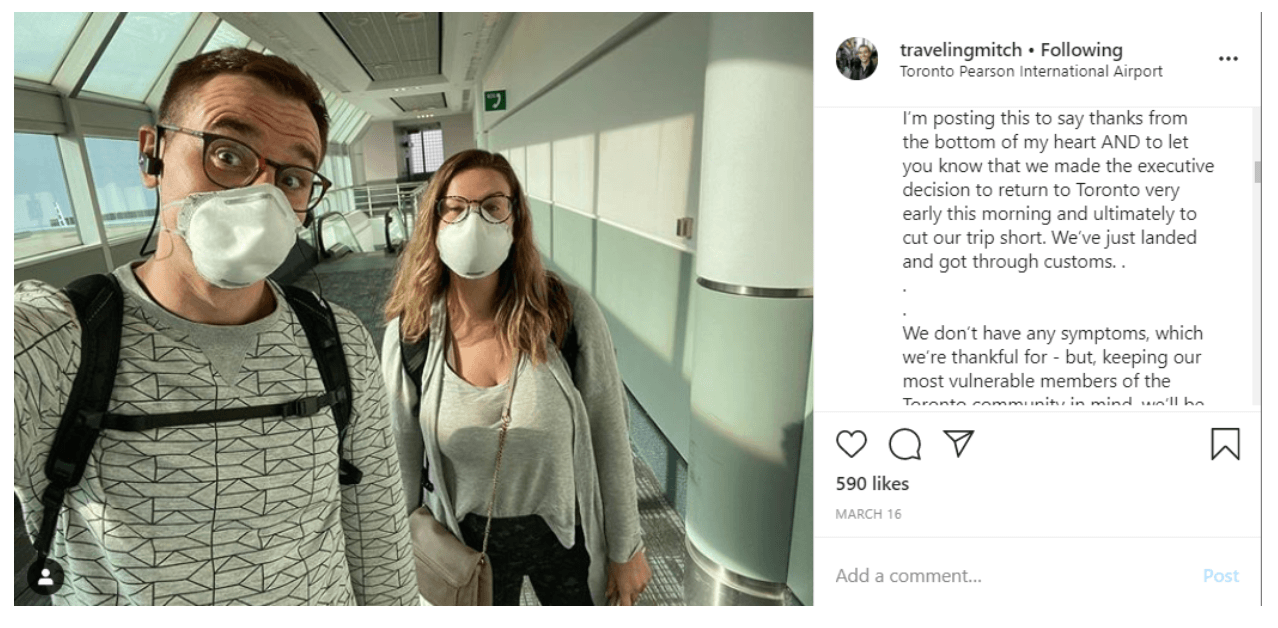
Others are ready to camp out for the long run, like this post made to a private digital nomad group. The poster doesn’t have a “home” to return to, so she decided to stay put in Vietnam for the foreseeable future. From the looks of things, she’s making the best of it while she soaks up the sun in her rooftop swimming pool.

Let’s explore a few comments that show why some chose to stay abroad.
Several people said the decision was practically made for them, as they had no “home” to go back to.
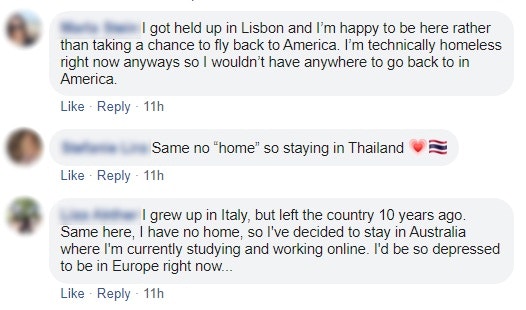
Some stayed put because they felt that going home to their family would put themselves and their loved ones at risk.

And this curveball: an American who actually fled from the US to Nicaragua when they saw that the pandemic was getting real.

How Nomads Are Weighing Their Options
For some, the decision to stay or go is a no-brainer. But for many, the decision can be stressful and panicked. There are a lot of things to consider, like:
- Do I have the financial resources to stay where I am? What if I lose my income?
- Do I have a stable, reliable, and comfortable place to live – abroad or in my home country? If not, can I find one quickly and within my means?
- How much time is left on my visa? If it’s running out soon, can I contact the local immigration office to see if there are any extensions or new rules?
- If I get sick, do I have health coverage or can I afford the out-of-pocket medical costs?
- Do I have friends or contacts who can support me if (more like when) I need it?
- If I experience an emergency, can I problem-solve on my own, including being able to communicate with locals?
- Am I needed back home to support my loved ones? If so, does that outweigh my desire to stay abroad?
There’s also the ethical side: is it selfish to travel when it’s not absolutely necessary? If I don’t have steep repercussions, can I afford inconvenience over putting myself and others at risk of getting sick?
You should absolutely follow social distancing guidelines when you can. (#flattenthecurve y’all!) But of course, it’s not always that simple.
For Some, There’s Nowhere to Go
It can be stressful to make a choice like choosing to ditch your life trajectory. But many nomads and their expat and traveler counterparts have more troubling problems.
For example, some nomads have a blurry path forward. They face hellish combinations of visa expirations, closed borders, and even countries that have encouraged foreigners to leave by imposing fees and strict rules for staying.
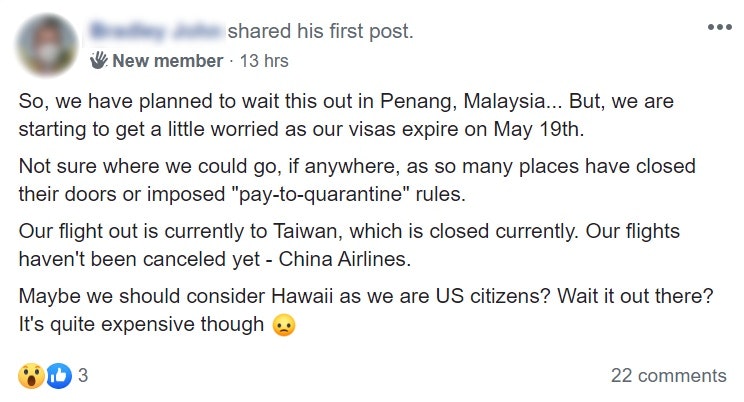
I’ve also seen shocking stories of travelers being stranded abroad, unable to catch a flight back to their home country because there simply aren’t any more.
In March, many countries started scrambling to repatriate their citizens. They blasted out emergency messages and organized last-minute buses and flights to bring people back before they became stuck.
But for some, these messages didn’t come soon enough.
For example, it’s believed that 10,000 tourists from all over the world are currently stranded in Nepal, where hundreds of thousands of travelers go each year to hike the gorgeous mountains.
In late March, the Nepalese government ordered a stringent lockdown. In addition to halting all air and ground travel, businesses and government offices were shut. Thousands of foreigners are simply trapped.
Social Media Saves the Day
Looking through the digital nomad groups I’ve joined on social media, there are loads of posts where nomads are looking to connect.
Like some of the posts above, nomads are using social media for the same reasons they always have. Perhaps they’re looking for predictions on how things will turn out or they’re just bored and looking for some interesting conversation to pass the time.
But for some, these groups are a way to crowdsource urgent advice.
Like this couple that didn’t foresee government decisions in Thailand and now fear that they’ll be displaced or separated.
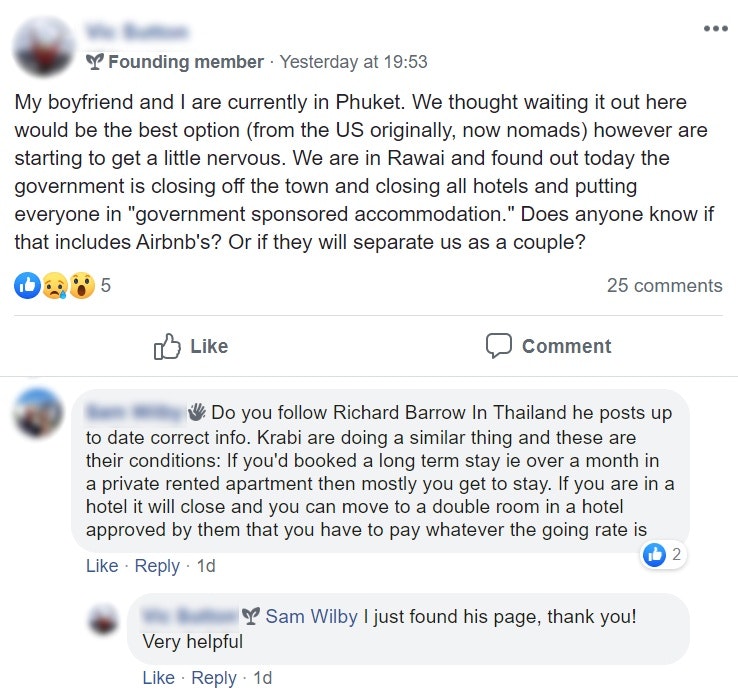
While the state of things can be bleak, it’s been inspiring and heart-warming to see strangers come together and support each other through these groups. If you feel like you need some support, traveler groups might be the place to find it.
Now, for a slight shift in gears: let’s talk money.
How Nomads Are Faring Financially
After public health and safety concerns, finances are usually close to follow. This goes for everyone: common people, small businesses, mega corporations, and whole countries. You’d be hard-pressed to go a day without hearing speculation on the next global economic meltdown.
With nonessential companies forced to close, and many going out of business, unemployment rates in some countries have reached an all-time high. One expert suggests that as of early April, US unemployment might already be as high as 13 percent – more than 40 million people.
So how is this all affecting the financial situation for digital nomads and other remote workers? It really depends who you ask and what kind of work they do.
For example, the travel bloggers I’ve spoken to are feeling the pain. When people can’t travel, they don’t visit these blogs to plan their trips. No web traffic means no revenue from ad sources like affiliate marketing and influencer marketing. Yikes.
But it’s not always grim. Let’s weigh out a few decline and growth factors that influence a remote worker’s finances.
Decline Factors
With many companies shutting their doors indefinitely, their remote workers are out of luck. This doesn’t necessarily correlate with a certain industry or job role, though workers in more “essential” industries have better chances of keeping their work.
(Is anyone else already tired of the words “essential” and “nonessential?”)
For the companies that have managed to stay afloat, but are struggling to keep up, drastically cutting costs might be the only option. Historically, this means slashing common nomad jobs that relate to proactive business growth activities like marketing, public relations (PR), and web development.
Growth Factors
On the flip side of the marketing and PR coin, many companies have kicked these activities into hyper-drive to make sure they stay relevant and helpful in what many are calling the coronavirus economy. Oddly enough, this means that some marketers are out of work while some are busier than ever.
Another consideration is that lockdowns and shelter-in-place orders mean that the world is “going virtual.” Many companies are scrambling to find temp workers to fill needed gaps in their workforce as they adapt to the online shift, which means new work openings.
Not to mention the desperate need for customer service as panicked customers flood the phone lines… have you tried calling a bank lately? Clear your schedule.

Tips for if You’re Still Abroad
If you’re abroad, check out these tips to stay updated – and hopefully safe and healthy.
1. Contact Your Nearest Embassy
Do a Google search for “[your home country] embassy in [country you’re in].” Call or email the embassy to sign up for their update list. This way, you get double the benefits: you can ask them your critical questions while making sure they can find or evacuate you in case of an emergency.
2. Contact Your Local Immigration Office
Visa issues can be a huge roadblock in figuring out your plans. Do your due diligence to try and get some answers, like seeing if the country you’re in is temporarily extending or waiving visa limits. Just be patient, because the uncertain nature of the whole world right now means that you might not get a straight answer.
3. Consider Travel Insurance if You Can
As an American, health insurance is a touchy issue. I’ll leave it at that. But if you’re currently uninsured, I strongly urge you to check out your options. Try top-rated travel insurance companies like World Nomads, Allianz Global Assistance, or AIG Travel Guard.
4. Join Social Media Groups for Crowdsourcing and Support
Like I mentioned earlier, social media connections can be an absolute life-saver. Waiting this out abroad is a Facebook group for… well, people who are waiting this out abroad. Connect with fellow nomads in Facebook groups like Digital Nomads Around the World and NOMADS. Ladies, check out Girls LOVE Travel and Digital Nomad Girls Community.
Resources to Keep Bookmarked
Here are some resources to check regularly and cross-reference so that you can make sure you’re getting balanced information. Keep them bookmarked on your computer and phone so you can reference them easily:
- World Health Organization (WHO) is a leading global resource for COVID-19 updates.
- You should also follow your home country’s top public health agencies. Like the WHO, each organization will have a dedicated COVID-19 page that includes critical updates and implications for citizens.
- Some agencies have specific pages for travelers, like the US Centers for Disease Control and Prevention’s (CDC) page that features traveling FAQs and travel health notices for each country.
- International Air Transport Association (IATA) keeps a detailed and regularly-updated list of travel regulations in each country. Be sure to cross-check this info with other sources, like local governments and entities in each region.
Now We Watch, Wait, and Hope
Like the rest of the world, digital nomads are stuck in a vortex of uncertainty. Until this is all over, life is on hold indefinitely. Kind of like a bank’s customer service line.
While a nomad’s need for stability and security shows itself differently than the average person, we’re all in the same boat of watching, waiting, and hoping for the best – for ourselves and others.



